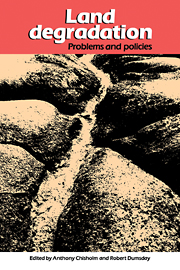Book contents
- Frontmatter
- Foreword
- Contents
- The Contributors
- Figures
- Tables
- Glossary
- Preface
- Land degradation and government
- I Physical and biological aspects of land degradation
- II Social costs
- III Legal, institutional and sociological factors
- IV Behavioural causes, economic issues and policy instruments
- V Pressure groups, public agencies and policy formulation
- VI Towards more effective policies for controlling land degradation: an overview
- A Rational approaches to environmental issues by Anthony Chisholm
- B Comments by Bruce Davidson
- C Comments by John Thomas
- D Participants at workshop on land degradation and public policy
- Bibliography
- Index
C - Comments by John Thomas
Published online by Cambridge University Press: 05 February 2012
- Frontmatter
- Foreword
- Contents
- The Contributors
- Figures
- Tables
- Glossary
- Preface
- Land degradation and government
- I Physical and biological aspects of land degradation
- II Social costs
- III Legal, institutional and sociological factors
- IV Behavioural causes, economic issues and policy instruments
- V Pressure groups, public agencies and policy formulation
- VI Towards more effective policies for controlling land degradation: an overview
- A Rational approaches to environmental issues by Anthony Chisholm
- B Comments by Bruce Davidson
- C Comments by John Thomas
- D Participants at workshop on land degradation and public policy
- Bibliography
- Index
Summary
Blyth and McCallum (Chapter 4) claim that two recent studies of the costs of salinity degradation are of limited use for public policy, other than perhaps as providing measures of the magnitude of the degradation. The studies were by the Working Party on Dryland Salting in Australia (1982) and Peck, Thomas and Williamson (1983). In his commentary on Section II Greig agrees with Blyth and McCallum: A few grand scale evaluations of the costs of land degradation have been attempted, yet the results are of questionable significance for policy making. Greig continues ‘the costs ought to be considered on a case-by-case, or catchment-by-catchment basis, beginning with the most rapidly degrading ones’.
These commentators equate policy-relevance with benefit-cost analysis, which I suggest is a narrow viewpoint. The desire for action to combat land degradation does not, as a matter of fact, begin with benefit-cost analysis, but with observation of degradation processes and (in broad terms) their social and economic impacts. Evaluation of alternative policies and particular projects comes later. But in any case the step from evidence to policy will be taken with or without benefit-cost analysis. Expositions of utilitarian purity may or may not be policy-relevant, depending on who the policy-makers are (Bennett and Thomas 1982 discuss this at length). Nevertheless, both benefit-cost analysis and broad-scale appraisal of the problem may influence policy if they are incisive enough. Peck et al produced a number of propositions about salinity which are relevant to policy, a point which seems to have escaped Blyth and McCallum, and Greig.
- Type
- Chapter
- Information
- Land DegradationProblems and Policies, pp. 363 - 364Publisher: Cambridge University PressPrint publication year: 1988



